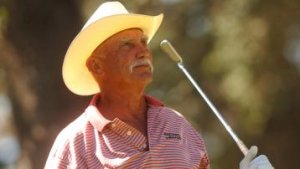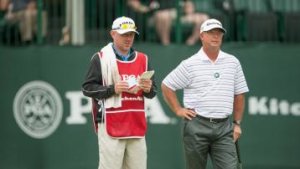Why is Race Such a Troubling Topic for Golf?
 Ryan Ballengee
Ryan Ballengee May 23, 2013 8:54 PM
COMMENTARY | Everyone in golf, let's agree to a moratorium on talking about race for a while. Before someone embarrasses the game again.
It's been an ugly couple of days for race relations and golf. England has been the epicen
ter of a pair of monumentally insensitive comments made about African-Americans.
First, it was
Sergio Garcia using a racial epithet -- serving fried chicken, like this was the antebellum American South -- to facetiously suggest a makeup dinner menu with Tiger Woods. Given that Garcia is the poster child for verbal diarrhea, it was the first thought that came to his mind, meaning it was his natural inclination to say something that offensive.
Tiger Woods responded on Twitter, calling the remark what it was: "wrong, hurtful and clearly inappropriate."
Garcia apologized twice, once in a statement and again in a news conference the following day. He told the press he would not be fined or suspended by the PGA Tour and European Tour, whose leaders were in attendance when Garcia made a mess of an otherwise lovely night. Garcia said both Tim Finchem of the PGA Tour and George O'Grady were "fine with it," before quickly explaining he meant they accepted his apology.
O'Grady then got himself into trouble on Thursday in trying to explain the European Tour's decision not to discipline the Spaniard -- in the process, using an insensitive term of his own.
"We know the connotation in the United States," O'Grady said to Sky Sports. "We accept all races on the European Tour; we take it very strongly. Most of Sergio's friends are colored athletes in the United States, and he is absolutely abject in his apology and we accepted it."
The Brit didn't date himself back to the Civil War era like Garcia did, but carelessly harkened back to the segregated South. Perhaps as embarrassing was O'Grady used the term "colored" while trying to bolster Garcia's race-relations cred with the "he's got friends of all races" excuse.
It's the kind of folly that makes you slap your forehead, mainly because you can't slap either of these otherwise redeemable people in the face.
The whole thing was further exacerbated late Thursday, when
Fuzzy Zoeller weighed in on the consequences for Garcia. Zoeller, you'll remember, also dropped a fried-chicken reference (as well as one to collard greens) when talking about Tiger Woods' Masters champions dinner as he was winning his first major in 1997.
"It'll all blow over," Zoeller said referring to Garcia,
according to the Associated Press. "Those boys will be fine."
Blow over? It certainly didn't for Zoeller, who lost sponsorships and earned a dinged reputation for what he said 16 years ago.
Besides, Zoeller isn't the arbiter of Garcia's punishment. The 33-year-old's fate lays in the hands of sponsor TaylorMade-adidas, the golfing public and Woods himself. Perhaps the U.S. Open at Merion next month will be the best indication of how the public will receive Garcia - the same venue where he hopes to apologize to Woods in person.
Who knows, Woods could chose to forgive Garcia and make a public show of support for the guy that has gotten under his skin at different times of the last 15 years.
Regardless of how Woods chooses to deal with Garcia, these incidents are not only repulsive, but they're embarrassing for the game of golf. They show key figures in the game don't seem to understand how to speak, and not just about race. The situation is made worse in how the masses will quickly move on to the next story, well before the sport can collectively demonstrate this kind of row isn't the norm.
Then again, maybe it is, for some. Woods' former caddie, New Zealander Steve Williams, celebrated with grand exuberance when his current loop, Adam Scott, won for the first time with Williams on the bag nearly two years ago. Months later, explaining the celebration at a similar gala-style event, Williams said his display intended to "shove it up that black arse----." The problem with those kinds of off-hand and off-color comments is they tend to paint someone with a broad, bristly brush.
Put race aside for a moment and consider the sport hasn't opened its arms to the LGBT community either. What about the ardent defense of Chick-fil-A and its CEO Dan Cathy by several PGA Tour players when he revealed his opposition to gay marriage? Of course, it was all cloaked under the guise of the players' faith. It's what the Bible says, they said.
The Bible also says to love your neighbor as yourself. And at a time when players are leaving the game, maybe the greatest commandment should be of more import than Good Book's millennia-old stance on social issues.
No one can make any of the people implicated above change their belief, or their impulses about race, sexuality or anything else. That decision is ultimately theirs, and no one should try to force anyone to change. However, their decision to voice those views -- explicitly or implied, instinctively or premeditated -- not only has implications for them, but also for the sports as a whole.
Comments like these lead people outside of the game to ask questions and generalize (sure, stereotype) who golfers are. Frankly, I don't want to be lumped into that.
So, again, I ask politely to everyone in the game to honor Woods' request: Let's just talk about golf.
Ryan Ballengee is a Washington, D.C.-based golf writer. His work has appeared on multiple digital outlets, including NBC Sports and Golf Channel. Follow him on Twitter
@RyanBallengee.


